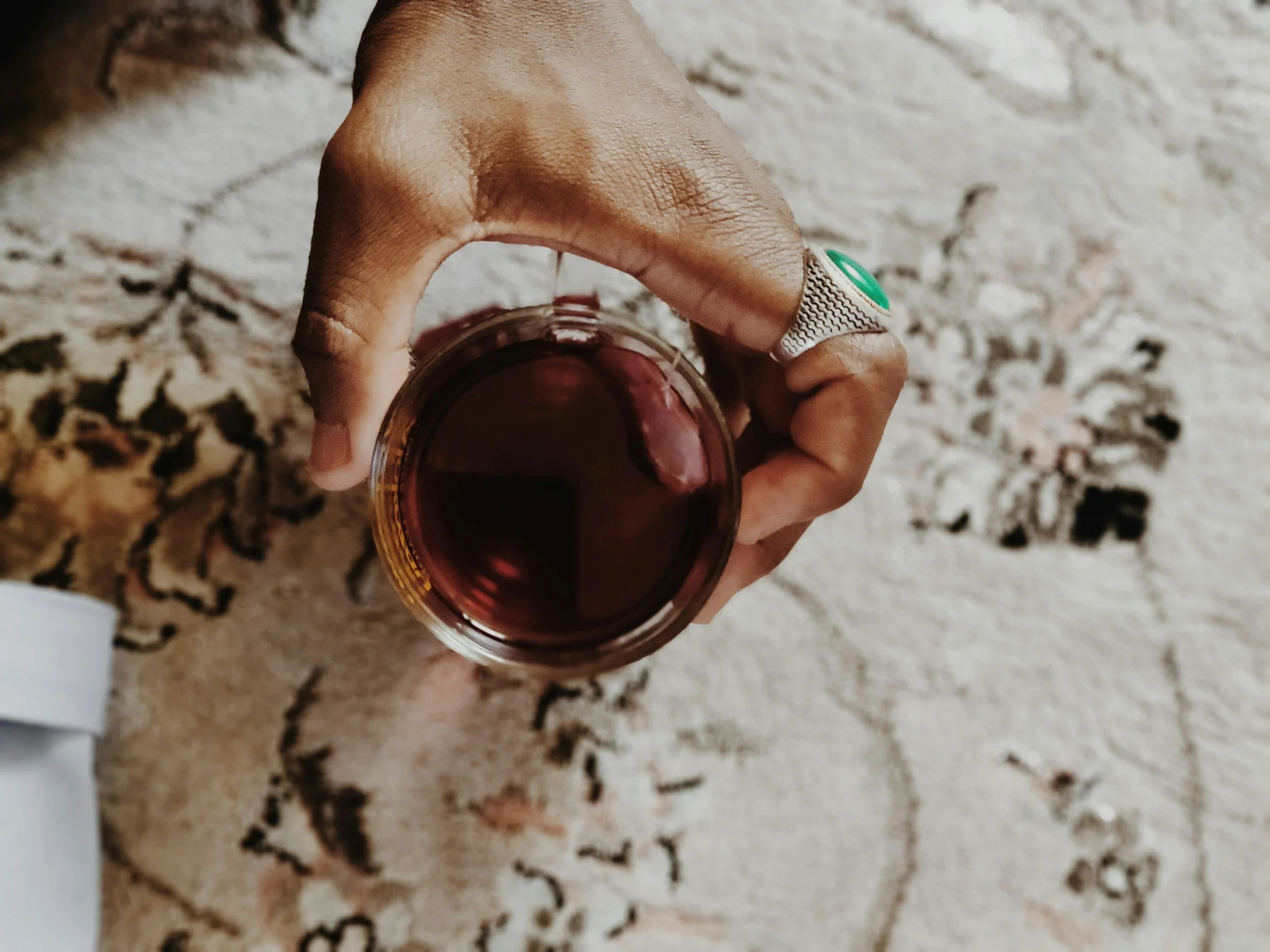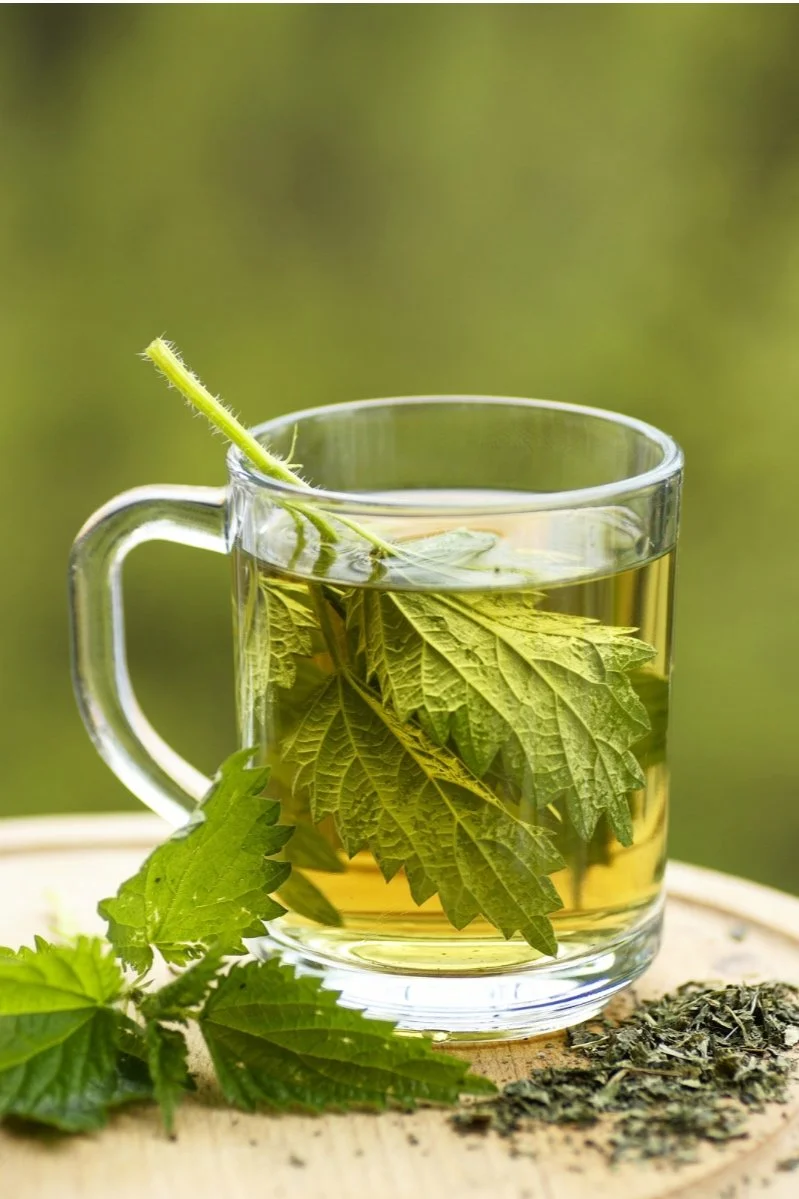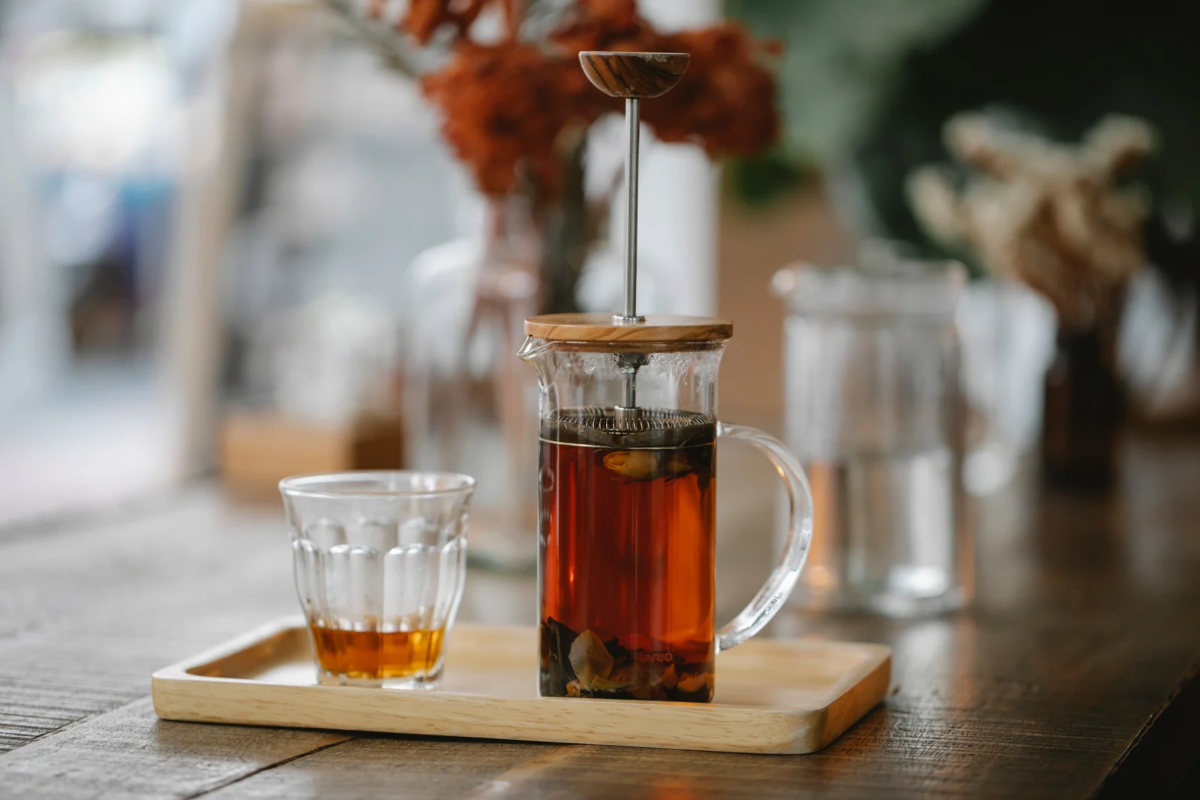Herbal Teas & Infusions to Reduce Stress and Increase Fertility
The Science of Stress, Hormones, and Fertility
In the world of wellness, you’re often encouraged to reduce stress in order to bring your body back into balance. But is that even possible in this modern world?
Typically, stress comes from your job, your family and relationships, living in close proximity to other people that don’t necessarily share your same values or priorities, and the ever increasing volatility of the world at large. Even when you’re trying to avoid it, stress actually is all around.
Which one of these things can you realistically reduce?
While stress is unavoidable, it’s still important to understand how it’s affecting your body — especially if you’re trying to conceive.
It’s also important to realize that there are natural, accessible, and sustainable ways to help your body deal with the effects of unrelenting stress and improve your chances of getting pregnant.
One such way is with Herbal Infusions - gentle, nourishing teas made from affordable, easy to get, and pleasant tasting plants. These infusions offer a powerful, yet simple, solution for increasing your stress resilience and supporting hormone health.
In this post, I’ll explain how stress impacts your hormones and how you can start using simple herbal remedies to bring your body back into balance, one sip at a time.
How Stress Affects Your Hormones and Fertility:
When your body senses a threat, or stressor, whether it’s an unpleasant encounter with your boss, a disagreement with your bestie, or even watching a new episode of Stranger Things for the first time, your body responds by sending a signal from your brain to your endocrine system to prepare you for appropriate action. Typically, this would be fighting, fleeing, or freezing to avoid danger.
This hormonal stress response is a complex process that has both short and long term effects on how your body functions. The immediate response is for your adrenal glands to begin releasing catecholamines, a series of hormones that includes adrenaline, which cause rapid changes in your body focused on immediate survival: increased heart rate and blood pressure, heightened alertness and focus, increased blood flow to your muscles, and elevated blood glucose levels to supply your cells with the energy they need for optimum speed, strength, and cunning.
The secondary response is for your adrenal glands to release cortisol. Cortisol also increases blood glucose levels, suppresses non-essential (to immediate survival) functions such as digestion and reproduction, and modulates immune system responses - in the short term this can be beneficial by heightening the immune response in the face of threats, but long term it results in suppression of the immune system and increased susceptibility to infection.
In an ideal world, once the stressful episode is over, your body would easily return to a parasympathetic state, allowing blood flow to return from your muscles to your internal organs and endocrine glands (your thyroid, ovaries, and pancreas). Digestion and elimination would resume their normal rhythm. Hormone production and nerve impulses would flow throughout your body uninhibited by excess tension and inflammation.
But as we’ve established, you don’t actually live in an ideal world. Instead you bounce from one stressful event to the next.
You come home from a stressful day of emails ‘circling back’, order whatever has the shortest delivery time from DoorDash, watch a (few) new episode(s) of Stranger Things, have difficulty falling asleep, scroll through your blue light radiating Instagram feed, and get stuck watching GRWM Reels from women that don’t even exist in real life.
You stay up too late, are woken up by the blaring of your cell phone alarm, rush through your morning with nothing for breakfast but coffee, sit at your desk again, staring at your work computer for 8 hours straight, come home to unwind with a glass of wine and a little more Netflix binging. On and on with very little real down time.
This chronic, even low-level, stress exposure leads to increased inflammation because your body isn’t able to focus on proper detoxification, hormonal imbalances because your blood flow is shifted away from your reproductive and digestive hormones in favor of your stress hormones, and adrenal exhaustion due to the constant activation of your stress response. All of this leads to a cascade of issues such as breakouts and rashes, irregular periods and PMS, difficulty getting or staying pregnant, chronic digestive orders, and generalized inflammation leading to pain and discomfort.
Breaking this cycle once you're in it is almost as difficult as a time-traveling back to a time before cellphones and social media. Unless you develop a set of intentional self-care practices that deactivate your sympathetic stress response, neutralizing the effects of living under chronic stress in a way that is enjoyable, easy to implement, sustainable long-term, and doesn’t cost your entire 401K.
Herbal Infusions, Stress Relief, Hormonal Balance, and Improved Fertility
Why Herbal Infusions?
Herbal infusions are one of the most effective ways to nourish your body and help it adapt to stress. Unlike supplements, which often focus on standardized, isolated compounds, herbal infusions offer the whole plant’s benefits, providing a synergy of nutrients, minerals, and phytonutrients that your body can absorb easily.
These infusions work from within, replenishing essential vitamins and minerals that are needed for soothing your nervous system, supporting hormone balance, and aiding your body in its natural detoxification processes. Herbal infusions both replenish nutrients that are used up by the stress response and assist your body to be more resilient to stress. With regular use you’ll be better able to return to a non-stressed state allowing for natural repair, regeneration and general well-being.
Top Herbs to Infuse for Stress Resiliency, Hormone Balance, and Better Fertility
The following list is made up of some of my favorite herbs for infusing. They are primarily leaves and flowers of plants that have high vitamin and mineral content, as well as phytonutrients than support detoxification through the liver, kidneys and bladder, soothe the nervous system with their aromatic compounds, regulate cellular metabolism, and are high in antioxidants to protect your cells from oxidative stress.
Lemon Balm (Melissa officinalis)
Lemon Balm is a gentle yet powerful herb known for its calming and mood-enhancing properties. Traditionally used to reduce anxiety, promote relaxation, and improve sleep, it is an excellent choice for those experiencing stress or nervous tension. Lemon balm supports the nervous system, making it beneficial for relieving mild anxiety, nervous indigestion, and restlessness. It also has a soothing effect on the digestive system, helping to ease discomfort such as bloating, gas, and nausea.
In addition to its calming effects, lemon balm is rich in vitamins such as vitamins C and B-complex, which support immune function and energy production. It also contains key minerals like calcium, magnesium, and potassium, contributing to healthy muscle function, nerve relaxation, and overall metabolic balance. Lemon balm’s antiviral properties make it useful in supporting the immune system, particularly during times of cold sores or other viral infections. Overall, lemon balm is a versatile herb that promotes emotional well-being, digestive health, and immune support.
Nettles (Urtica dioica)
Nettle is a highly nutritious herb rich in vitamins A, C, K, and several B vitamins. These vitamins support immune function, eye health, and skin health while promoting proper blood clotting and energy production. Nettles are particularly high in minerals including iron, calcium, magnesium, potassium, and silica, which are essential for maintaining strong bones, healthy blood circulation, and overall vitality.
Nettles are a well-known tonic for the blood due to their high iron content, making them beneficial for individuals with anemia or low energy. They also act as a natural diuretic, promoting kidney health by helping to flush out toxins and excess fluids from the body. Nettles have anti-inflammatory properties and can alleviate symptoms of conditions such as arthritis, allergies, and hay fever by reducing inflammation and balancing histamine levels.
Additionally, nettles are used to support women's health, particularly for strengthening the uterus during pregnancy and promoting lactation postpartum. Their combination of nutrients makes them excellent for improving overall wellness, supporting digestion, and fortifying the body during times of stress or illness.
Red Clover (Trifolium pratense)
Red Clover is a nourishing herb traditionally used for its ability to support women’s health, particularly in hormonal balance. Rich in phytoestrogens, specifically isoflavones, red clover is known for its use in managing menopausal symptoms such as hot flashes, night sweats, and mood swings. It helps to gently balance estrogen levels in the body, making it a popular herb for women experiencing menopause or irregular cycles.
In addition to its hormonal benefits, red clover is packed with essential vitamins and minerals, including vitamins C and K, calcium, magnesium, and potassium. These nutrients are crucial for supporting bone health, circulation, and overall vitality. Red clover has a long history of use as a blood purifier and promotes detoxification by supporting the lymphatic system and liver.
Red clover’s anti-inflammatory and antioxidant properties make it beneficial for skin conditions like eczema and psoriasis, helping to soothe irritation and promote healing. It is a gentle expectorant, useful in addressing respiratory issues such as coughs and bronchitis by loosening mucus and easing congestion. Overall, red clover is a versatile herb that nourishes the body, supports hormonal balance, and aids in detoxification and skin health.
Oat Straw (Avena sativa)
Oat straw is a deeply nourishing herb known for its ability to support the nervous system, promote relaxation, and enhance overall vitality. It is often used as a tonic for individuals experiencing stress, anxiety, or burnout due to its calming and restorative properties. Oat straw is especially rich in minerals such as calcium, magnesium, and silica, which support bone health, strengthen hair and nails, and maintain healthy skin.
In addition to its mineral content, oat straw contains a range of vitamins, including vitamins A, B-complex, C, and E, which contribute to energy production, immune function, and skin health. Its high magnesium levels make it particularly beneficial for soothing muscle tension and promoting restful sleep, making it a great choice for those dealing with insomnia or tension-related discomfort.
Oat straw is also considered a nourishing adaptogen, helping the body cope with physical and emotional stress over time. It gently supports the endocrine system, making it helpful for balancing hormones and supporting reproductive health. With its gentle yet powerful tonic effect, oat straw is often used to restore vitality, especially during periods of recovery, convalescence, or exhaustion.
Hibiscus (Hibiscus sabdariffa)
Hibiscus is a vibrant, tangy herb known for its ability to support cardiovascular health and promote hydration. Rich in antioxidants, particularly vitamin C and flavonoids, hibiscus is prized for its role in reducing oxidative stress and supporting the immune system. One of its most well-known benefits is its ability to help lower blood pressure naturally, making it an excellent choice for those looking to support heart health. Hibiscus is also mildly diuretic, helping to reduce water retention and bloating while supporting healthy kidney function.
In addition to its cardiovascular benefits, hibiscus is a cooling herb, making it ideal for soothing the body during times of fever or inflammation. It supports healthy digestion by easing indigestion and promoting regularity. Hibiscus is rich in vitamins A and C, which support immune function and skin health, and it also contains essential minerals such as calcium, magnesium, and iron, contributing to overall vitality and wellness. The tart, refreshing nature of hibiscus makes it a popular ingredient in teas for promoting hydration and supporting detoxification. Overall, hibiscus is a nourishing, heart-supportive herb that promotes overall well-being, hydration, and immune health.
How to Make an Herbal Infusion
Choose your herbs:
Select one or a combination of the herbs mentioned above, using 1-2 tablespoons of dried herb per cup of water.
Boil water:
Bring fresh, filtered water to a boil.
Add herbs:
Place your dried herbs into a heatproof jar, teapot, or French press. See my favorite infusion supplies below.
Pour water
Pour the hot water over the herbs, ensuring they are fully submerged.
Steep:
Cover and let the infusion steep. You can steep for as little as a few minutes if you just want a cup of tea on the fly, or as long as overnight if you’re making a larger batch and want maximum potency. Longer steeping times allow the herbs to fully release their vitamins, minerals, and beneficial compounds into the water.
Strain and enjoy:
After steeping, strain the herbs out and enjoy your infusion. You can drink it warm or cold, depending on your preference. Use honey or maple syrup to sweeten, if you like.
Storage:
If you make a larger batch, store the infusion in the refrigerator for up to 3 days. You can drink it throughout the day to nourish your body and calm your nervous system.
Where to Buy Herbs and Tea Making Supplies
My Favorite Tea Brewing Supplies
Click on the heading below to expand each category.
Looking for More?
Fertile Earth offers a comprehensive and strategic approach to treating fertility and other hormonal issues. It’s not about trying to find the one thing that’s going to unlock your fertility, but understanding the right things for you at the right time and applying them with expert guidance and compassionate support.









